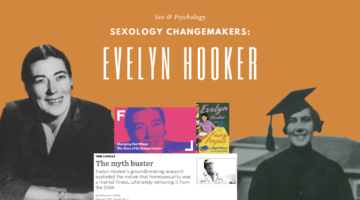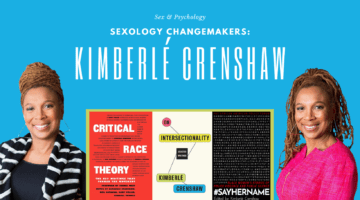4 Things I’ll Miss About Academia—And 4 Things I Won’t
September 5, 2018 by Justin Lehmiller
I made a major career move this summer. After working ten years as a college professor, I decided it was time for something new: I left academia to become a full-time author. My reasons for this were both personal and professional.
On the personal side, one of my family members developed a serious health condition at a young age, which got me rethinking my priorities in life. It made me realize that you can’t keep delaying what it is that you really want to do. You never know what’s going to happen, and if you wait too long, you might very well miss your chance.
On the professional side, the writing career that I’d been cultivating since I started this blog in 2011 finally reached the point where it could be a full-time, self-sustaining job in and of itself–and it was no longer something I could easily confine to my spare time. I found myself working two full-time jobs simultaneously, which meant that my work-life balance was completely out of whack.
I decided to drop academics and become an author because, ultimately, writing is what I love. In fact, it’s what I’ve always loved. Believe it or not, my first-ever job was as a film critic for my hometown paper in Ohio, The Canton Repository. I actually got paid to watch and write about movies—how cool is that? But now I can get paid to watch porn and write about sex, so that’s pretty cool, too.
It was a tough decision to leave the academy, though, because there are a lot of things I love about it. Here are four things I’ll miss about being a college professor—and four things I won’t miss at all.
The Things I’ll Miss
1.) Working with students in the classroom. Teaching can be a downright thrilling experience when you get to see students learn and grow. For those of you who aren’t teachers, this might sound silly, but I can recall several occasions on which I got goosebumps in the classroom in response to a really insightful comment made by a student. When you see that a student has truly thought about the course material, connected the dots, and made a novel insight, it is an awesome thing to witness. To make an analogy, it’s honestly not unlike hearing your child speak their first words.
2.) Teaching study abroad courses. The only thing I’ll miss more than working with students in the classroom is taking them on study abroad trips. For the last two years, I taught study abroad courses in the Netherlands on sex and culture—and those were the most rewarding experiences of my entire teaching career. Some of the students I took had never been out of the Midwestern US, and some had never even been on an airplane. Having the opportunity to watch these students take in a different cultural environment that completely changes their worldview in so many ways is something I will never forget. If you ever have a chance to teach (or take) a course like this, I have one piece of advice: DO IT.
3.) Working next door to brilliant and friendly people. Working alongside other professors can be really intellectually stimulating. If you want feedback on a research idea, have a statistical question, or need teaching advice from an expert, it’s all available for free just a few steps away. At least in my experience, fellow academics have always been very generous with their time and expertise—I’ve been fortunate to be in cooperative rather than competitive environments and my career was enriched because of the mentorship provided by my colleagues.
4.) The academic calendar. I won’t lie—having predictable winter, spring, and summer breaks is pretty nice. Of course, there’s no such thing as a true “break” when you’re a professor—“breaks” are really just the time when you get to work from home in your pajamas and catch up on your research, grading, and email. Even so, I never needed to ask for holidays off or to request vacation time.
4 Things I Won’t Miss at All
1.) Faculty meetings. Oh my god. The meetings. No matter how long they’re scheduled, they never finish early, and often run over. The same issues get discussed over and over, meeting after meeting, sometimes for years before any significant progress or resolution is made. Faculty members frequently behave like the students they always complain about in class during these meetings, too—you know, working on their email, writing papers, or texting their partner instead of being engaged—which causes the meetings to go on far longer than necessary. People are frequently asking questions that were already answered, which is frustrating. Also, any time a new university policy or procedure is discussed, the meeting turns into a Festivus “airing of grievances” in which people take turns venting about university and departmental bureaucracy. It is not hyperbole to say that nothing drains the life out of you quite like one of these meetings.
2.) Endlessly reformatting your CV. When you submit a CV for your annual review or for promotion and tenure, or when you need to submit a CV for a grant application, you can’t just turn in your regular-old CV. You need to submit a specially formatted version. And sometimes said CV needs to be created with a specific piece of software—software that is very buggy and extremely user-unfriendly. More than once, I literally needed to input EVERYTHING I’d ever done in my entire academic career into a program like this and, unfortunately, it was never as simple as copying and pasting each line–there were dozens of separate fields that needed to be filled out for each item and supporting documentation had to be uploaded in each case. I am not exaggerating when I say that we sometimes spend weeks just trying to create one of these specially formatted CVs. Faculty members continually waste an enormous amount of time creating these documents–time that could instead be spent working on research, preparing lectures, or mentoring students. And for what? As far as I can tell, the sole purpose was to save administrators and grant-review panels a few seconds when reviewing our CVs.
3.) Pressure to publish a specific number of papers per year and bring in grants—even if you don’t need grants for your research. In pretty much every academic job I’ve ever had, there has been an explicit expectation that I publish a certain number of research papers each year. It doesn’t matter if the research is high quality or even important—it just needs to be in print in a peer-reviewed journal. It should go without saying that publishing research for the sake of doing so isn’t a recipe for generating good science. The same goes for pursing grants when you don’t need or want them simply because they university wants you to start subsidizing your own salary. I’ve been fortunate in the sense that I haven’t required grant funding to do most of my research. However, I was still under enormous pressure to apply for grants anyway in order to bring in what are known as “indirect costs” to the university (i.e., the portion of a grant that goes to the school to pay for administrative expenses, facilities, etc.). And because the topics I study don’t have many avenues for funding as it is (given how politically controversial sex research is), the only way I could apply for grants and have any shot at success was to study things I wasn’t really interested in just because they were more fundable (not because they were more important or worthwhile). This is an unrealized cost of forcing faculty members who don’t need grant money to pursue it anyway: they spend countless hours putting together long-shot grant applications to study what they think the funding agencies want them to study instead of what the researchers themselves actually think is important. That doesn’t advance scientific progress–it impedes it.
4.) Being incentivized to ignore work-life balance. At one of the universities I worked at, I was required to attend a lecture by a bigwig administrator on work-life balance. This administrator told us that the way they achieve balance is by giving 6 days per week to the university and taking Sunday for themselves. Well, except sometimes they need to check email and work on Sundays, so they don’t always take the day off. A junior faculty member asked this administrator if they had time to exercise, to which they replied, “Yes, but only if I’m up by 5 AM every morning.” This is what was presented to us as a model of “balance” and, to be perfectly honest, I was horrified. Giving six and sometimes seven days a week to your job—no matter what it is—is not healthy. In academics, however, the more out of whack your work-life balance becomes, the more you are rewarded. The only way to get tenure and to get ahead is to sacrifice your personal time to write more grants, publish more papers, sit on more committees, and get more involved in professional organizations. Most academics I know struggle with work-life balance for their entire careers and they get used to making work their entire life. It starts in grad school and only gets worse from there. This is a big part of the reason why I know so many older academics who literally don’t stop working until they die because they don’t know how to do anything else. It’s for this reason that I have always advised my students to (1) be sure to take time for themselves, especially on breaks, (2) take their university email off of their phone because they don’t need to be available at all times of the day and night, including when they’re with their families—work can wait, and (3) remember that there will *always* be something you could be working on, but this doesn’t mean you have to be doing it right now—stop feeling guilty about taking time for you.
Want to learn more about Sex and Psychology ? Click here for previous articles or follow the blog on Facebook (facebook.com/psychologyofsex), Twitter (@JustinLehmiller), or Reddit (reddit.com/r/psychologyofsex) to receive updates.
Image Source: 123RF/Srinrat Wuttichaikitcharoen
You Might Also Like:

Dr. Justin Lehmiller
Founder & Owner of Sex and PsychologyDr. Justin Lehmiller is a social psychologist and Research Fellow at The Kinsey Institute. He runs the Sex and Psychology blog and podcast and is author of the popular book Tell Me What You Want. Dr. Lehmiller is an award-winning educator, and a prolific researcher who has published more than 50 academic works.
Read full bio >


